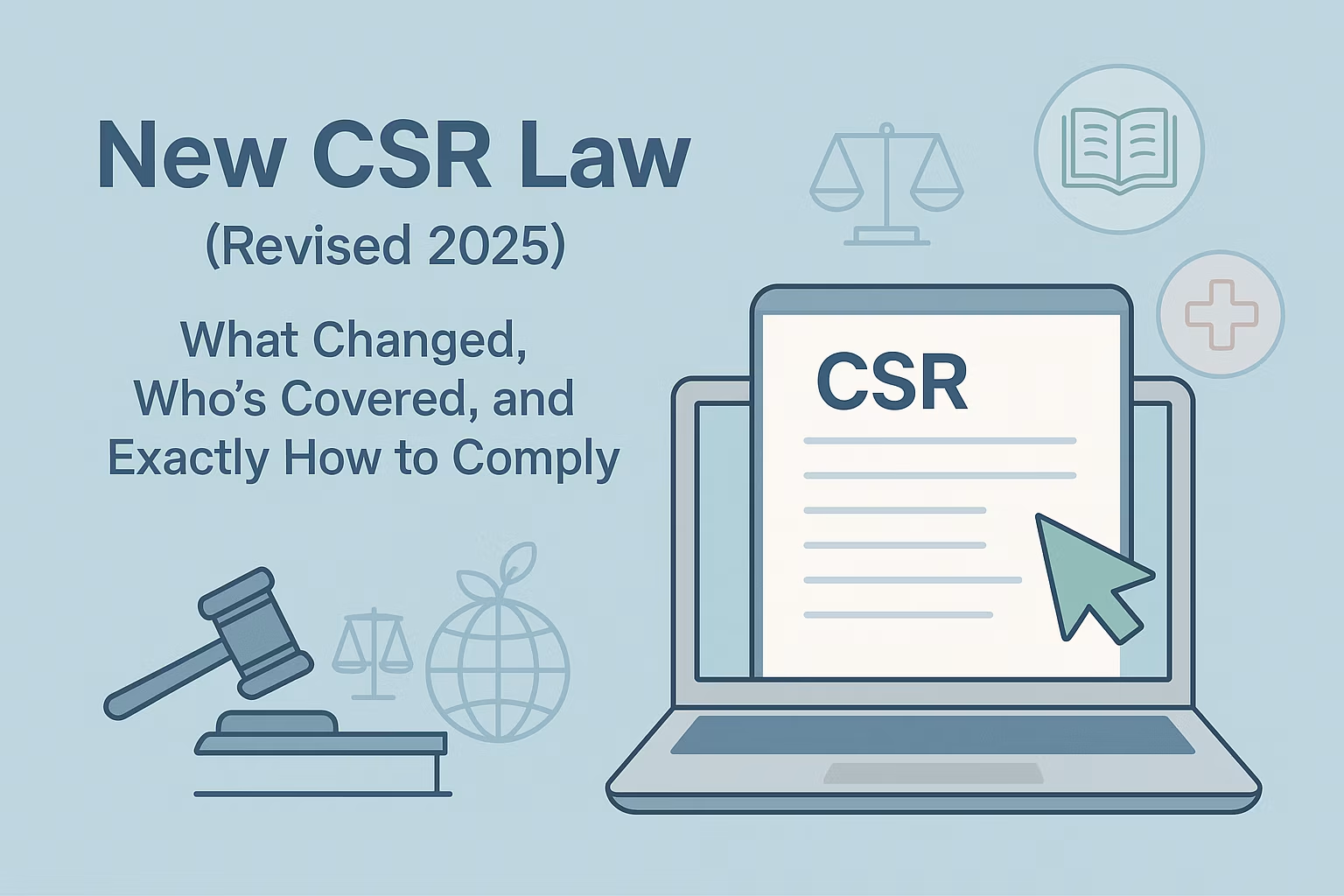New CSR Law (Revised 2025)

Table of Content
Key Takeaways
- CSR-1 goes web-only (MCA21). Expect real-time checks and more fields (tax registrations, geography, parent-company links).
- Eligibility is clearer & stricter for implementing agencies; 3-year track record rules still apply (where applicable).
- CSR-2 deadlines have moved around: for FY 2023-24, MCA extended the filing to June 30, 2025. Watch future MCA notices for the next cycle.
- Spending rule unchanged: 2% of the average net profits of the previous three years; unspent rules (Unspent CSR A/c vs. Schedule VII Fund) continue.
- False declarations carry teeth under Sections 448 & 449 (false statements / false evidence). Don’t wing it.
Effective July 14, 2025, the Ministry of Corporate Affairs (MCA) enforced a major overhaul to India’s corporate social responsibility regulations via the Companies (Corporate Social Responsibility Policy) Amendment Rules, 2025.
The centerpiece of this reform is a fully digitized, web-only CSR-1 form on the MCA21 portal—ending the era of downloadable PDFs and manual entries (Taxmann).
This update isn’t just procedural—it marks a significant shift toward data transparency, accountability, and eligibility-based screening. Entities seeking CSR funds must now provide detailed legal and tax disclosures, prove registration under specific laws, and meet eligibility criteria like a 3-year activity track record.
For companies, the burden of due diligence and partner verification has increased, while implementing agencies face stricter scrutiny from the start (India Briefing, CAP India).
The push for digital-first compliance reflects the government’s broader commitment to ensuring CSR funds are routed only to credible, registered, and traceable entities, thereby enhancing the overall impact and accountability of corporate philanthropy in India.
Top NGOs in Educational Sector in India
The CSR-1 form must now be completed online via MCA21. The previous PDF format has been discontinued entirely.
This change brings faster approvals, real-time validation, and fewer formatting errors—but it also means there's zero room for error or incomplete entries.
Applying for CSR funds? Read this to guide to secure CSR funds successfully
Entities must now provide detailed information such as:
- Type of organization (Section 8 company, registered trust, registered society, etc.)
- Income tax status — including approvals under 80G, 12A, or 10(23C)
- Granular geographic fields — including Country and Area/Locality
- Linkage to parent or sponsoring companies, if applicable
Only these types of organizations are eligible:
- Section 8 companies
- Registered societies/trusts
- Government-established bodies
- Statutory entities
If the entity was not created by a company, it must demonstrate a minimum 3-year track record in conducting similar CSR activities.
To register under the new CSR-1, you must submit:
- Valid PAN
- Email OTP verification
- Digital Signature Certificate (DSC)
- Professional attestation by a CA, CS, or CMA
Pitching your CSR project for the first time? Read this to deliver a successful pitch
If any entity files false information or misrepresents facts, it can face penalties under:
- Section 448 (false statements)
- Section 449 (false evidence)
These are not symbolic threats—violations can lead to serious fines or even imprisonment.
A company must comply with CSR provisions if it meets any ONE of the following thresholds in the previous financial year:
- Net Worth: ₹500 crore or more
- Turnover: ₹1,000 crore or more
- Net Profit: ₹5 crore or more
Such companies must spend 2% of their average net profits over the last three years on CSR activities.
Unspent CSR
If your company fails to spend the full 2%:
- For ongoing projects:
Transfer the funds to an Unspent CSR Account within 30 days of FY end. These funds must be utilized within 3 financial years, or else transferred to a Schedule VII Fund. - For other cases:
Directly transfer unspent amounts to a Schedule VII Fund within 6 months of the end of the financial year.
See how to build a patient centric hospital in 2025
- Confirm entity type and 3-year track record, if needed
- Gather tax certificates: 80G, 12A, 10(23C), PAN, governing docs
- Set up MCA21 account with correct OTP-enabled email
- Prepare DSC of your authorized signatory
- Log in and fill CSR-1 online: include entity, tax, geo, and linkage fields
- Upload required supporting documents
- Get CSR-1 form certified by CA/CS/CMA
- e-Sign and submit the form
- Save your CSR-1 number and acknowledgment for future reference
Check how to write a CSR Annual Report
- During partner onboarding → Verify CSR-1 registration status (India Briefing)
- Throughout the year → Track CSR spend vs. budget; classify projects (ongoing/non-ongoing) (CA2013)
- By FY close → Transfer unspent funds to the right accounts within deadlines (Coal India)
- Board reporting → File CSR activities in the Board’s Report (Annexure II) (KPMG)
- CSR-2 → For FY 2023–24, extended to June 30, 2025 (IBC Law)
For Companies
- Verify CSR-1 status of each partner
- Confirm tax approvals (80G/12A/10(23C))
- Classify projects properly (ongoing vs. others) (Coal India)
- Build a monitoring and CFO sign-off plan
- Don’t miss CSR-2 deadlines (IBC Law)
For Implementing Agencies
- Keep PAN, bye-laws, governing resolutions, and tax certs ready
- File CSR-1 using MCA21 + DSC + attestation
- Align your reporting format with CSR-2 standards (KPMG)
1) Do previously registered agencies need to re-file CSR-1?
No re-registration is needed. But from July 14, 2025, all new registrations must be made through the web interface. Always verify your status on MCA21.
2) What exactly counts as “implementing agency” eligibility now?
Section 8 companies, registered trusts/societies, and government/statutory bodies are eligible. If not set up by a company, agencies must show a 3-year track record. Must also disclose 80G, 12A, or 10(23C) status.
3) What are the CSR-2 due dates going forward?
CSR-2 deadlines are governed by the Companies (Accounts) Rules, 2014. For FY 2023–24, the extended deadline is June 30, 2025. Always check the latest MCA notice. (IBC Law)
4) If we can’t spend the full 2%, what do we do?
For ongoing projects: Transfer to Unspent CSR A/c within 30 days and use within 3 years.
For everything else: Transfer to a Schedule VII Fund within 6 months.
5) Where do we find the official 2025 notification?
Refer to G.S.R. 452(E), published in the MCA-linked CSR-1 update.
This 2025 CSR reform isn’t just a change in form it’s a nationwide push for transparent governance, structured compliance, and digitally traceable CSR spending. With India’s CSR ecosystem becoming more regulated, CSR-1 is now the new KYC a credibility benchmark for all implementing partners.
For CSR-eligible companies in India, this is the time to streamline your compliance strategy, select verified partners, and ensure every rupee creates measurable impact.
For NGOs and implementing agencies, your CSR-1 registration is your compliance passport—make sure it's accurate, approved, and backed by verifiable documents.
BuiltX works exclusively with non-profits across India to build socially impactful infrastructure fully aligned with the latest CSR Law 2025 compliance standards.
If you're a company looking for credible partners to execute infrastructure projects anywhere in India. Book a free consultation now
